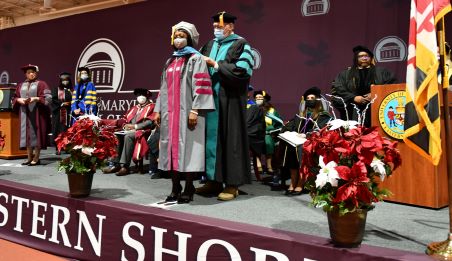
The 2022 spring semester will be Dr. Derry Stufft’s swansong as founding director of UMES’ doctoral program in education leadership.
Stufft, who turned 73 this past December, is retiring from full-time work after a 52-year career in education spanning the spectrum from kindergarten to graduate school. He will continue as a dissertation adviser to current students he recruited to the program.
“I am just an old fisherman wading into the sunset,” Stufft wrote in a self-deprecating email.
Stufft joined UMES’ faculty in the fall of 2009 to create a graduate program for primary and secondary school educators looking to climb the career ladder as principals, administrators and superintendents.
He came to Princess Anne from Pennsylvania, where for 35 years he worked as a public school educator and administrator before spending four years on the faculty of the University of Scranton.
Winding down his tenure in the K-12 sector nearly two decades ago, Stufft remembers telling a journalist he “would love to create, start, teach … run a doctoral program.”
A friend had purchased a house on the Eastern Shore, where Stufft would visit to go fishing. “I liked the area,” he recalled. “I do hunt (too). It would be nice to retire here.”
Stufft and his wife eventually bought a get-away home in Temperanceville, Va. When he learned UMES was laying the groundwork to start a graduate-level education leadership program, he saw an opportunity to fulfill a long-held personal goal.
He created from scratch UMES’ curriculum featuring 17 new courses, drawing on three-plus decades as a public school administrator, including three stints as a K-12 superintendent. He stitched together a team of adjunct instructors drawn mostly from the ranks of superintendents.
“He did that and so much more,” said Dr. Karen Verbeke, retired chairwoman of UMES’ education department. ” I remember him taking a personal interest in the professional development of each of the students in the program.
“His experience as a classroom teacher, principal, superintendent and professor made him a credible, relevant leader for this program,” Verbeke said. “I am sure that UMES and its ‘EDLD’ students will miss him!”
“We all had been there,” Stufft noted of the faculty he recruited. “It wasn’t book learning. It was hands-on, on-the-job teaching about real-life challenges and circumstances schools are facing.”
The “weekend, mid-career” program also appeals to people in other professions; currently one student in the criminal justice field commutes from Atlanta. Another is an administrator at Children’s National Hospital in Washington.
Then there is Dr. Richard Warren, the state of Maryland’s 2018-19 public schools Teacher of the Year and now a UMES professor. Warren holds three degrees from the university.
“Dr. Stufft gave me the confidence, assurance, guidance, and support to be able to have a successful experience,” Warren said. “Dr. Stufft was also my dissertation chair. He gave me the push that I needed, gave me the critique that I needed it, and most importantly, he gave me the affirmation that I needed to see the dissertation journey through. He helped me to believe in myself, and that I could be the first in my family to earn a terminal degree.”

Stufft is not difficult to miss in front of a classroom or on stage at graduation draping a doctoral hood around the neck of students who have earned a terminal degree in education leadership.
At 6-feet 7-inches, he jokes that he tells degree candidates they won’t likely have to kneel for him to execute higher education’s ultimate rite of passage.
Stufft used his stature to get an education and escape the generational cycle of working in western Pennsylvania’s coal mines. A standout prep athlete in Somerset County, Pa. (near the site of the Flight 93 plane crash on 9-11), he accepted a basketball scholarship from Rutgers University in New Jersey. There, he crossed paths with an older student-athlete by the name of Jim Valvano, who became one of college basketball’s most colorful coaches of the late 20th century.
The history major’s first job upon returning home in 1970 was teaching sociology and economics at a vocational technical high school – and eventually adding coaching basketball and baseball to his duties. His early experiences taught him effective teachers had to be flexible and accessible, a guiding principle he follows to this day.
Educators today face a far more complex profession magnified by the lingering COVID-19 pandemic, Stufft said.
“Public education has become so politicized,” he said. “You have to have thick skin … work at having great community relations, and strong political skills.”
“We used to say education is the solution to our problems,” Stufft said. “I think some believe today we’ve moved to where (people) see education as the problem.”
“That’s very upsetting to me,” he said.
COVID-19, Stufft said, taught him to rethink instructional management theories he and his faculty colleagues have tried to convey to students.
The pandemic “has challenged everything we thought we knew about how to deliver an education,” he said. “We’ve had to talk about the importance of being willing to adjust. It’s become more community relations and putting in 14 hour days, sometimes six days a week.”
Stufft has encountered students dealing with stress over whether to remain educators let alone pursue higher profile jobs in the profession.
“I tell them it’s important to embrace adaptability,” he said, adding, “… have a work-life balance. (Remember to) think of how many lives you are affecting.”
When he reflects on his decision to retire, Stufft said he’s tried to be guided by the belief that “I’m paying it forward.”
“I tell students ‘it’s your job to prepare the next generation.’ I’m preparing you to replace me,” he said.
“Somebody helped me to get me where I am,” Stufft said. “Now, it’s your job to help someone else get ahead.”
A 2,500 square-foot fruit-and-vegetable garden in Temperanceville beckons.

